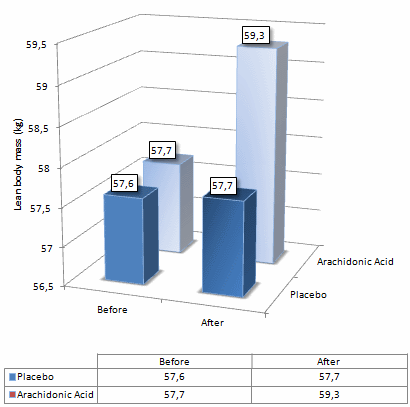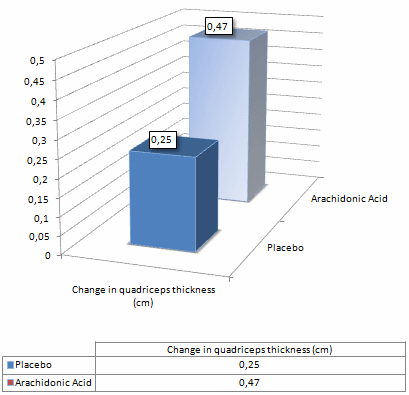Background
To determine the impact of AA supplementation during resistance training on body composition, training adaptations, and markers of muscle hypertrophy in resistance-trained males.
Methods
In a randomized and double blind manner, 31 resistance-trained male subjects (22.1 ± 5.0 years, 180 ± 0.1 cm, 86.1 ± 13.0 kg, 18.1 ± 6.4% body fat) ingested either a placebo (PLA: 1 g·day-1 corn oil, n = 16) or AA (AA: 1 g·day-1 AA, n = 15) while participating in a standardized 4 day·week-1 resistance training regimen. Fasting blood samples, body composition, bench press one-repetition maximum (1RM), leg press 1RM and Wingate anaerobic capacity sprint tests were completed after 0, 25, and 50 days of supplementation. Percutaneous muscle biopsies were taken from the vastus lateralis on days 0 and 50.
Results
Wingate relative peak power was significantly greater after 50 days of supplementation while the inflammatory cytokine IL-6 was significantly lower after 25 days of supplementation in the AA group. PGE2 levels tended to be greater in the AA group. However, no statistically significant differences were observed between groups in body composition, strength, anabolic and catabolic hormones, or markers of muscle hypertrophy (i.e. total protein content or MHC type I, IIa, and IIx protein content) and other intramuscular markers (i.e. FP and EP3 receptor density or MHC type I, IIa, and IIx mRNA expression).
Conclusion
AA supplementation during resistance-training may enhance anaerobic capacity and lessen the inflammatory response to training. However, AA supplementation did not promote statistically greater gains in strength, muscle mass, or influence markers of muscle hypertrophy.


